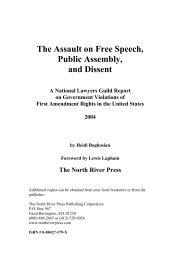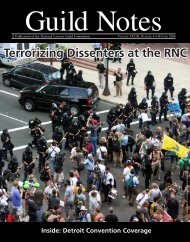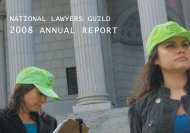legal observer training manual (PDF) - National Lawyers Guild
legal observer training manual (PDF) - National Lawyers Guild
legal observer training manual (PDF) - National Lawyers Guild
Create successful ePaper yourself
Turn your PDF publications into a flip-book with our unique Google optimized e-Paper software.
<strong>National</strong> <strong>Lawyers</strong> <strong>Guild</strong><br />
Legal Observer Training Manual
NATIONAL<br />
LAWYERS GUILD<br />
LEGAL OBSERVER<br />
TRAINING MANUAL<br />
<strong>National</strong> <strong>Lawyers</strong> <strong>Guild</strong><br />
143 Madison Ave 4 th Fl<br />
New York NY 10016<br />
212-679-5100<br />
www.nlg.org<br />
© 2003 <strong>National</strong> <strong>Lawyers</strong> <strong>Guild</strong><br />
This <strong>legal</strong> <strong>observer</strong> <strong>training</strong> <strong>manual</strong> is copyrighted and protected by the copyright laws of the United States<br />
of America. Nevertheless, this <strong>legal</strong> observing <strong>training</strong> <strong>manual</strong>, or any portion hereof, may be reproduced<br />
in whole or in part by political activists, organizers and their <strong>legal</strong> representatives, so long as attribution is<br />
made to the <strong>National</strong> <strong>Lawyers</strong> <strong>Guild</strong> in a prominent place on the reproduced material. Any other use of any<br />
portion of this <strong>legal</strong> observing <strong>training</strong> <strong>manual</strong> is strictly prohibited by law.<br />
Cover photo credit: Heidi Boghosian
CONTENTS<br />
A. ROLE AND RESPONSIBILITIES OF LEGAL OBSERVERS<br />
What Is the Legal Observer Program? 1<br />
Who Are Legal Observers? 1<br />
Responsibilities of the Legal Observer 1<br />
Legal Observer Coordinator 2<br />
Legal Observer Dress and Actions 2<br />
Visibility 2<br />
Teamwork 3<br />
Objectivity 3<br />
Interacting with Police 3<br />
Preparing for the Role of Legal Observer 4<br />
On the Day of the Action 5<br />
During the Demonstration 5<br />
If People Are Arrested 6<br />
Some Typical Charges Arrestees May Face 7<br />
Be Particularly Aware of Certain Unconstitutional Police Tactics 7<br />
“Pop-Up” Police Lines 7<br />
Denial of Access to Public Fora 8<br />
Intimidating Displays of Force 8<br />
Speaking to the Media 8<br />
Setting up a <strong>National</strong> <strong>Lawyers</strong> <strong>Guild</strong> Mass Defense/<br />
Demonstration Committee 8<br />
Preserving Physical Evidence 9<br />
After the Demonstration 10<br />
Legal Observation at Small or Local Events 10<br />
B. ORGANIZING AND TRAINING A LEGAL OBSERVER TEAM<br />
I. Preparations for Organizing, Training, and Deploying<br />
Legal Observers at Large Actions<br />
Issue a “Call for Legal Observers” on the <strong>National</strong> <strong>Lawyers</strong><br />
<strong>Guild</strong> Web Site 11<br />
References 11<br />
Form Housing Committee 11<br />
Identify Existing or Locate Office Space 12<br />
Organize Messengers 12<br />
Anticipate Contingencies 12<br />
Legal Observer Coordinators Structure 12<br />
Legal Observer Coordinator Communications 12<br />
Important Information to Create and Gather 12<br />
Gathering and Using Legal Observer Data 13<br />
Develop Trust with Activists 13
Control <strong>National</strong> <strong>Lawyers</strong> <strong>Guild</strong> Legal Observer Identifiers 13<br />
Appoint a Media Coordinator 13<br />
Legal Team Roles 13<br />
To Deploy, or Not to Deploy 14<br />
II. TRAINING<br />
Anticipate the Need for Last-Minute Legal Observer Trainings 14<br />
Recommend Mini-Recorders 14<br />
Keeping Alert and Aware 14<br />
Other Organizations Training Legal Observers 14<br />
Using Email for Communication 15<br />
III. DURING THE ACTION<br />
In Deploying Legal Observers, Anticipate Problems 15<br />
Often, the Legal Observer Coordinators Are the First to<br />
Realize the Potential for Problems 15<br />
“Rover” Squads 15<br />
Be Flexible 15<br />
Encourage Legal Observers to Submit Reports Promptly 16<br />
Contact Information 17<br />
APPENDICES FOR LEGAL OBSERVERS<br />
Legal Observer Application<br />
Confidentiality Agreement<br />
A Quick Reference for Legal Observers<br />
Legal Observer Field Notes Example<br />
Legal Observer’s Arrest Sheet<br />
Exit Form
Acknowledgements<br />
We gratefully acknowledge the contributions of the following individuals and organizations in<br />
the production of this <strong>manual</strong>:<br />
Deb Laguitaris<br />
Bruce Bentley<br />
Mac Scott<br />
Carol Sobel<br />
Zak Wolfe<br />
The Partnership for Civil Justice<br />
The NYC People's Law Collective<br />
L. Roy Zipris<br />
Kit Gage
NATIONAL LAWYERS GUILD<br />
LEGAL OBSERVER TRAINING MANUAL<br />
The Legal Observer (LO) <strong>manual</strong> is divided into two sections. Section A details the role<br />
and responsibilities of Legal Observers. Section B outlines how to establish a Legal<br />
Observer team for a large or complex event.<br />
A. ROLE AND RESPONSIBILITIES OF LEGAL OBSERVERS<br />
This section contains basic information to equip you for your responsibilities as Legal<br />
Observers. Please review it before attending a <strong>National</strong> <strong>Lawyers</strong> <strong>Guild</strong> Legal Observer<br />
<strong>training</strong> so that you can bring up any questions that are not answered after reading this<br />
document.<br />
What Is the Legal Observer Program?<br />
The Legal Observer program is part of a comprehensive system of <strong>legal</strong> support<br />
coordinated by the <strong>National</strong> <strong>Lawyers</strong> <strong>Guild</strong> designed to enable people to express their<br />
political views as fully as possible, without unconstitutional disruption or interference by<br />
the government and with the least possible consequences from the criminal justice<br />
system. In addition to Legal Observers, <strong>Guild</strong> attorneys provide <strong>legal</strong> defense for<br />
protestors who are arrested and bring civil litigation to protect protesters' Constitutional<br />
rights.<br />
Who Are Legal Observers?<br />
Legal Observers are typically, but not exclusively, law students, <strong>legal</strong> workers (for<br />
example, para<strong>legal</strong>s or employees of a community based organization that works on <strong>legal</strong><br />
issues) and lawyers who may or may not be licensed locally. Legal Observers are trained<br />
and directed by <strong>Guild</strong> attorneys, who often have established attorney-client relationships<br />
with activist organizations, or are in litigation challenging police tactics at political<br />
protests.<br />
Responsibilities of the Legal Observer<br />
The primary role of the Legal Observer is to be the eyes and ears of the <strong>legal</strong> team--to<br />
observe and record incidents and the activities of law enforcement in relation to the<br />
demonstrators. This includes documenting, for example, any arrest, use of force,<br />
intimidating display of force, denial of access to public spaces like parks and sidewalks,<br />
and any other behavior on the part of law enforcement that appears to restrict<br />
demonstrators’ ability to express their political views. This documentation needs to be<br />
done in a thorough and professional manner, so that lawyers representing arrestees or<br />
bringing an action against the police generally will be able to objectively evaluate the<br />
constitutionality of government conduct. Information gathered by Legal Observers has<br />
contributed to an extremely successful track record in defending and advancing the rights<br />
of demonstrators, including in criminal trials and several major lawsuits against Federal<br />
and local governments for their unconstitutional actions.
The presence of Legal Observers serves as a deterrent to unconstitutional behavior by<br />
law enforcement during a demonstration. Police officers are often deterred from<br />
engaging in unconstitutional activity when their actions are being documented.<br />
Legal Observers do not engage in crowd control, speak to the media, interfere with an<br />
arrest in progress or provoke actions. If asked for <strong>legal</strong> advice, it is best to refer<br />
protestors to <strong>Guild</strong> lawyers or provide them with Know Your Rights publications. This<br />
ensures demonstrators receive information that is accurate in the local jurisdiction, and<br />
avoids issues of the unauthorized practice of law.<br />
Legal Observer Coordinator<br />
The Legal Observer Coordinator is responsible for (1) serving as liaison with the Legal<br />
Team, including attorneys; (2) making sure that Legal Observers are located in critical<br />
spaces around the exterior of demonstration and at the front, back and sides of the march;<br />
and (3) collecting notes, green Legal Observer hats and armbands if worn, as well as any<br />
visual documentation (films or videotapes). The Coordinator is responsible for getting<br />
this documentation to the attorneys conducting criminal defense or civil action. If<br />
necessary and if requested, he or she may vet this written and visual documentation.<br />
Legal Observer Dress and Actions<br />
Legal Observers should generally avoid wearing shirts with political slogans or buttons<br />
that might undermine the credibility of all <strong>National</strong> <strong>Lawyers</strong> <strong>Guild</strong> Legal Observers.<br />
Although Legal Observers must always be prepared to face police harassment, there are<br />
good reasons to avoid unnecessary confrontations, the most obvious being that a Legal<br />
Observer who is dealing with police harassment is, during that time, unable to provide<br />
Legal Observer assistance to demonstrators.<br />
Visibility<br />
One of the primary functions of the Legal Observer is to act as a deterrent to dangerous<br />
or il<strong>legal</strong> activities by law enforcement. Thus, <strong>legal</strong> <strong>observer</strong>s should be visible to both<br />
activists and police.<br />
Methods to maintain visibility:<br />
• Identifying clothing<br />
- Legal Observer Hats<br />
- Badges or armbands<br />
• Announce presence of Legal Observers to activists and note identifying clothing<br />
• Maintain a central presence if possible, such as by having a Legal Observer table<br />
or banner where Legal Observers can be located and check in if necessary.<br />
• Dress comfortably and conservatively. Note how members of the media dress, in<br />
casual clothes with lots of pockets.<br />
Legal Observer hats and armbands are available from the <strong>National</strong> <strong>Lawyers</strong> <strong>Guild</strong><br />
<strong>National</strong> Office and will be given out at Legal Observer <strong>training</strong>s.<br />
2
Teamwork<br />
Legal <strong>observer</strong>s are safest and most effective when they work in teams. Try to avoid the<br />
impulse to run off on your own no matter how chaotic the event may get. Your partner<br />
depends on you. One should take notes, and the other should record the action via<br />
audiotape, still camera, or video camera, if your local <strong>Guild</strong> Chapter or Legal Team so<br />
advises. The note taker can help the visual recorder by watching for interference from<br />
others or by pointing out poor walking surfaces, such as a nearby curb.<br />
Not all actions will have sufficient <strong>legal</strong> <strong>observer</strong>s on hand to work in teams. In these<br />
instances, exercise additional caution. Check in frequently with the Legal Observer<br />
Coordinator or command center.<br />
Objectivity<br />
The NLG coordinates and deploys Legal Observers for the purpose of safeguarding and<br />
advancing the Constitutional rights of the demonstrators. We do not pretend that we<br />
have no politics. It is not even uncommon for the NLG to have a public position similar<br />
to that of the demonstrators we are supporting in a <strong>legal</strong> capacity, as, for example, at a<br />
protest against a war that the NLG has condemned as unlawful. Nevertheless, the Legal<br />
Observer role is a distinct one, and needs to be approached with a high measure of<br />
professionalism.<br />
To properly serve our purposes, the NLG <strong>observer</strong>s need to be identifiable as a part of the<br />
professional <strong>legal</strong> support on which demonstrators count. Think about what kind of<br />
person would best put the police on notice that their actions are being documented as part<br />
of a professional operation that will hold them accountable in Court for any violations of<br />
protesters’ rights. We should take every step we can to maximize the benefit to the<br />
demonstrators who are counting on an effective <strong>legal</strong> support team. Also, the attorneys<br />
who will be reviewing your notes are counting on you to be thorough and professional.<br />
Especially with the growing use of the lime green Legal Observer hats that people readily<br />
identify with the <strong>National</strong> <strong>Lawyers</strong> <strong>Guild</strong>, people know of our support by our mere<br />
presence. It is also helpful to explain to people — with the increasing numbers of new<br />
people stepping forward to express their views — what the <strong>Guild</strong> Legal Observers' role<br />
is, and the importance of maintaining that appearance of professionalism to the success of<br />
their demonstrations and the ability to defend against arrests.<br />
In short, we ask people to commit themselves to act as Legal Observers and not<br />
protestors, and avoid blurring of lines between Legal Observer and activist.<br />
Interacting with Police<br />
Do not argue or fraternize with the police. You may be arrested for any number of<br />
charges if you argue. And by being too friendly to law enforcement you may send the<br />
3
wrong message to protestors who rely on the <strong>Guild</strong> at demonstrations. However, you<br />
should ask the police pointed questions, such as, “Why are you telling people to leave<br />
this part of the park?” Their answers may later serve to document what is occurring for<br />
later evaluation, and may also serve to deter unconstitutionally overbroad restrictions on<br />
demonstrations.<br />
Preparing for the Role of Legal Observer<br />
Familiarize yourself with the various "Know Your Rights" materials that are available on<br />
the <strong>Guild</strong> website, www.nlg.org as well as www.civil-rights.net. These materials are<br />
largely directed toward an audience of political demonstrators, and will help you to<br />
identify some of the primary <strong>legal</strong> issues that may arise at demonstrations. We also have<br />
available packets of relevant statutory text and case annotations for certain jurisdictions.<br />
To be an effective Legal Observer, you should understand the kinds of situations that<br />
might lead to arrest, as well as the Constitutional and statutory limitations on law<br />
enforcement, as well as the common mistakes, attitudes, and decisions made by police<br />
that give rise to defenses to criminal charges.<br />
While Legal Observers, especially non-lawyer Legal Observers, should not give <strong>legal</strong><br />
advice, your observation should be informed by a general familiarity with the kinds of<br />
charges people might face, what happens when people get arrested, what defenses might<br />
be raised at trial, and what types of government misconduct might lead to civil litigation.<br />
You should also have a basic understanding of potential defenses such as the rights of<br />
assembly, speech, and to petition the government for a redress of grievances; justification<br />
(essentially, the commission of a harmful act reasonably believed necessary to avoid a<br />
greater harm); self-defense and defense of others; and de minimis infractions (where the<br />
actor’s conduct may have caused the harm that the law prohibits but to an extent too<br />
trivial to condemn with a conviction). This knowledge will help you identify things to<br />
look for and record during a demonstration. An overview of this information is provided<br />
in these written materials, but it is imperative that you rely upon local attorneys to<br />
provide you a list of the specific codes, charges, and possible punishments that may arise<br />
in your jurisdiction.<br />
Depending on what your local <strong>Guild</strong> Chapter or local Legal Team advises, you will need<br />
to bring the some of the following items with you:<br />
• Notebook and pens<br />
• Green <strong>Guild</strong> Legal Observer hat that identifies you as an <strong>observer</strong><br />
• Legal Team telephone list<br />
• Identification and bar card if you have one<br />
• Cell phone or adequate change for pay phone<br />
• Area map if needed<br />
• Police misconduct forms<br />
• Police department phone numbers: precinct-division-Headquarters<br />
4
• Audio recorder<br />
• Camera (disposable cameras are recommended)<br />
On the Day of the Action<br />
• Show up early, a bit before your appointed time<br />
• Check in with the Legal Observer Coordinator<br />
• Get your location assignment and double check it on a map<br />
• Become familiar with any mass transit in the area or arrange for other<br />
transportation<br />
• Exchange cell numbers with Legal Observer Coordinator and other Legal<br />
Observers<br />
• Check in with the Legal Observer Coordinator throughout the day<br />
• At the end of the day, check in with the Legal Observer Coordinator<br />
a. To sign out so they know you are present and out of harm<br />
b. To see if you are needed to go to a precinct or convergence center<br />
c. To surrender to the Legal Observer Coordinator any notes or evidence<br />
you may have collected<br />
During the Demonstration<br />
Take detailed notes, including:<br />
• What law enforcement agencies are present (city, county, state, federal, private<br />
security) and any names and badge numbers you are able to see, especially of those<br />
conducting an arrest<br />
• If you cannot see this kind of identifying information or if there is none, note down<br />
physical descriptions as best you can<br />
• Who is in charge<br />
• Warnings given, who gave them, what they said, how much of it (if any) you can hear<br />
• Routes taken by demonstrators (streets and times)<br />
• What media is present<br />
• Names of people arrested and their conduct (walk, passive, resists)<br />
• Officers' conduct and any special circumstances (force used, injuries, sweeps,<br />
inability of demonstrators to disperse)<br />
If you have a camera, and if your local Legal Observer Coordinator and Legal Team have<br />
asked that you do so, take a few photos to document the scene even before it appears that<br />
the police are intending to take any action with regard to the demonstrators.<br />
If an incident between police and demonstrators occurs, get as close to the scene as<br />
necessary to get a good perspective. A clear angle may be more important than getting<br />
close if your vision will be obscured. If you have a camera, the wider point of view may<br />
in fact reveal more than closer shots that are too narrow.<br />
5
Each note entry should begin with the time and location. If you know that people near<br />
you are intending to commit civil disobedience, introduce yourself and find out if there is<br />
someone designated to avoid arrest and act as a contact, such as an Aaffinity group<br />
support person." Much can happen very quickly once arrests start, but try to identify who<br />
is planning on being arrested or whether a support person is in the area who knows their<br />
names and is not getting arrested. Try to find out from the police where they are being<br />
taken for processing, and the likely charges. As soon as possible, alert the Legal Team<br />
about the arrests.<br />
It is essential that Legal Observers avoid being arrested themselves. If you are told by<br />
police that you must leave the area or be arrested, the most important thing is to remain<br />
calm and professional. Show the officer your <strong>legal</strong> <strong>observer</strong> ID and explain that you are<br />
working with attorneys who represent the demonstrators. Evaluate the situation and do<br />
not be scared-off too readily, but do not push to the point of being arrested. Legal<br />
Observers are far more effective when they are not incarcerated! If the police ask for<br />
your notes, tell them you are working with attorneys representing the demonstrators and<br />
that your notes are protected as work product.<br />
Stay vigilant at all times. Look for the incongruous detail which could indicate potential<br />
troublemakers or undercover police: the person who comes out of the crowd to join the<br />
march, people whose dress and general appearance aren't appropriate to the group they<br />
are with. Be watchful for counter-demonstrators who may instigate violence or try to<br />
provoke protestors.<br />
Violent fascist and hate groups have increased their visibility recently, particularly at<br />
demonstrations attended by people of color and immigrants. When you see potential<br />
problems, alert other <strong>legal</strong> <strong>observer</strong>s in your area so the potential problems can be<br />
monitored. If the demonstrators have organized security volunteers, you should alert<br />
them as well. Document observations that might be relevant to defenses of self-defense<br />
and defense of others, and to civil litigation. A conspiracy of two or more persons to<br />
deprive an individual of equal protection of the laws and equal exercise of their<br />
Constitutional rights is a violation of the Civil Rights Act of 1871, 42 U.S.C. S 1985(3).<br />
If People Are Arrested<br />
At the site of arrest you should ask the police where arrested people are being taken. If<br />
directed to do so by the Legal Observer Coordinator or local Law Collective, go to the<br />
appropriate precinct and talk to the desk Sergeant, ask about charges and when protestors<br />
will be released, advocating for their earliest release.<br />
Legal Observers witnessing arrests should get the arrestee’s name and as many names<br />
and phone numbers as fast as possible from surrounding witnesses. Deal with addresses<br />
and statements at a later time if need be. Encourage the arrestee and friends to shout out<br />
the arrestee’s name or affinity alias if the group has decided to practice <strong>legal</strong> solidarity.<br />
6
This is very important as law enforcement has sometimes denied access to arrested<br />
activists if we cannot provide a name.<br />
Ask to talk to the arrested protestors in the van and/or at the police station and tell them<br />
not to say anything except “I want to talk to a lawyer,” and explain that the team lawyers<br />
can answer detailed questions later. Make sure the <strong>legal</strong> team, or attorneys on call, or<br />
<strong>legal</strong> aid, or someone, knows about the arrests.<br />
Some Typical Charges Arrestees May Face<br />
This list is not meant to be comprehensive, or specific to any jurisdiction. Counsel must<br />
be consulted to determine local ordinances and statutes, and the penalties attached<br />
thereto.<br />
• Disorderly Conduct<br />
• Il<strong>legal</strong> Assembly<br />
• Conspiracy to Riot<br />
• Possession of Instruments of Crime<br />
• Resisting Arrest<br />
• Assaulting an Officer<br />
• Aiding and Abetting a Crime<br />
Be Particularly Aware of Certain Unconstitutional Police Tactics<br />
Several tactics of local and federal police agencies are being challenged as<br />
unconstitutional in pending litigation. You can read the Complaints in several major<br />
lawsuits against D.C. and Federal agencies at www.civil-rights.net. Please be especially<br />
aware of and carefully document the tactics listed below, as well as the more obvious<br />
offensive tactics like excessive force and unjustified arrests.<br />
“Pop-Up” Police Lines. Police sometimes deploy lines of officers who obstruct<br />
demonstrator movement, either misdirecting them, splitting up groups, or detaining and<br />
arresting the demonstrators. Please carefully document:<br />
• Where the police line is established, and when<br />
• Whether the police line is altering the flow of a march, or trapping people<br />
• Any identifiable groups that are being detained or obstructed, such as a “black<br />
bloc,” youth contingent, group leaving or going to a particular rally, bystanders<br />
watching the event<br />
• Names, badge numbers, and jurisdictions such as MPD, Park Police<br />
• What the police say is the reason for establishing the police line, if they will tell<br />
you, and what happens when demonstrators approach the police line and ask if<br />
they can leave<br />
• How this impacts the demonstrators: period of time detained, number of extra<br />
blocks they must walk to reach their destination<br />
7
Denial of Access to Public Fora. Police sometimes set up police lines or barricades that<br />
prevent people from using sidewalks, parks, and other public fora. Carefully document:<br />
• What spaces are “closed” in this manner<br />
• Names, badge numbers, and jurisdictions involved in the closure<br />
• What the police say is the reason for the closure<br />
• Who is being denied access - get at least a few names and contact information<br />
• How this impacts the demonstrators - beyond being unable to access those closed<br />
spaces, does this impact their ability to get to the site of a demonstration or cause<br />
groups to split-up or lose coherence?<br />
Related to this, sometimes the police will line a march and prevent people from joining<br />
or leaving the demonstration. Please be sure to document this as well, including exactly<br />
what happens when people try to enter or leave, and contact information for those people.<br />
Intimidating Displays of Force. Either as a sudden, “pop-up police line” as above, or<br />
established along march routes, the police employ various means of intimidation. This<br />
includes marching and striking their batons against their riot gear armor in unison, aiming<br />
large canisters of pepper spray at the crowd, jabbing their batons forward, and verbal<br />
threats. In addition to documenting who is doing this, please pay attention to how this<br />
impacts the demonstrators. Are people expressing concern or fear, or quieting down their<br />
chanting? Be aware that several instances of violence at demonstrations are alleged to<br />
have been committed by plain-clothed police agents provocateur.<br />
Speaking to the Media<br />
Legal Observers should refer reporters to the Media Team if there is one or the Legal<br />
Observer Coordinator. Legal Observers should limit their media contact, primarily<br />
because it may distract from observation tasks. Remember that police activity at one end<br />
of a march may be very different from what is happening at your end of the march. The<br />
government would love to use a Legal Observer's statement that “the police have been<br />
low-key all day” when the NLG sues for police brutality that occurred at the back half of<br />
the march.<br />
Setting up a <strong>National</strong> <strong>Lawyers</strong> <strong>Guild</strong> Mass Defense/Demonstration Committee<br />
The first step in establishing a Mass Defense or Demonstration Committee is to<br />
participate in a <strong>National</strong> <strong>Lawyers</strong> <strong>Guild</strong> Legal Observer <strong>training</strong>, if you have not already<br />
done so. Collect and read all <strong>Guild</strong> Legal Observer <strong>manual</strong>s. Invite <strong>Guild</strong> or local<br />
criminal defense lawyers and civil litigation lawyers to serve on the committee, either as<br />
active participants or as advisors. Immigration lawyers and disability lawyers are also<br />
useful. If you are a <strong>Guild</strong> Law School Chapter and do not have lawyer members, make<br />
contact with the nearest <strong>Guild</strong> chapter and ask them to help you. Ask the <strong>National</strong> Office<br />
to put you in touch with someone from the Mass Defense Committee.<br />
8
The next step is to select a Committee Coordinator and make sure that he or she has<br />
everyone's contact information, including cell phones. Schedule regular meetings, such<br />
as the second Wednesday of each month. This is important in order to review upcoming<br />
actions, to discuss pending arrests, to orient new members and to share up to date<br />
information. Make sure that the Committee maintains regular contact with the local<br />
<strong>National</strong> <strong>Lawyers</strong> <strong>Guild</strong> Chapter. Establish a telephone tree and/or email list as you get<br />
larger to make sure people know about upcoming events.<br />
Research local criminal law and, as best you can, find out about police patterns at<br />
demonstrations and actions. Get to know the location of local police stations, jails,<br />
immigrant detention centers etc. Make contact and establish working relationships with<br />
the local Public Defender or Legal Aid Office. Try to work out what role they can take in<br />
mass defense. If appropriate, and if organizational or members’ politics match that of the<br />
<strong>Guild</strong>, invite them to join the committee. Caution: in some areas this collaboration works<br />
well, in others it can be difficult. Use your best judgment.<br />
Consider issuing a press release announcing that the local chapter of the NLG has joined<br />
chapters around the country in developing a program to train and coordinate Legal<br />
Observers, who will document Constitutional violations at the upcoming demonstration.<br />
This is a way also to put the police on notice and explain your role, without appearing to<br />
be working "with" them.<br />
Get to know local activist organizations, unions, and community organizations. Let them<br />
know what you can offer but be careful not to offer more than you can actually do.<br />
Once you get going, invite other <strong>legal</strong> workers, lawyers, and law students to join, but<br />
make sure you train everyone. Offer to give “Know Your Rights” <strong>training</strong>s as well to<br />
organizations.<br />
Preserving Physical Evidence<br />
Obviously, you should not interfere with people receiving medical treatment. If someone<br />
is injured and receiving treatment, wait quietly off to the side until the treatment is<br />
concluded. There may be witnesses around that you can speak with while the person is<br />
being treated, and you can actually assist the medics by asking people to take a few steps<br />
back and tell you what they saw. The medics will generally need to move on quickly, but<br />
at least get their contact information. If the person who was injured wants to talk now,<br />
great; but if not, just ask if they want to leave contact information.<br />
If the police fire any kind of weapon, be sure to collect spent ammunition from the area.<br />
Photograph it before you retrieve it from its location, if possible. Rubber bullets and<br />
“beanbag” projectiles are easy to locate. Place them in a plastic evidence bag. Look for<br />
areas of impact as a starting point for live lethal rounds.<br />
9
After the Demonstration<br />
While the incident is still fresh in your mind, take a minute to review your notes to add<br />
any details that you may have abbreviated and clarify any shorthand notations. Later,<br />
when the demonstration has ended, review your notes again to make sure that they are<br />
legible and the events are understandable. Remember that any trial likely will not take<br />
place for months. For any significant incident, fill out the Legal Observer Summary<br />
Worksheet and provide it to the <strong>legal</strong> team for their evaluation of the <strong>legal</strong> significance of<br />
those events. You are taking notes and completing forms at the request of attorneys, to<br />
assist them in evaluating the <strong>legal</strong> significance of police conduct. Your notes are<br />
therefore privileged from disclosure to the government under the doctrine of Awork<br />
product immunity." However, it is conceivable that at some point it may be determined<br />
that you have unique information that is relevant to an issue in dispute in a <strong>legal</strong><br />
proceeding. In that event, you may need to be identified as a witness and potentially<br />
testify. It is possible that some of your materials may supboenaed by the government in<br />
certain circumstances. This is one more reason to be certain that your notes are very clear<br />
and accurate, and that you do not use shorthand or turns of phrase that could be<br />
misinterpreted.<br />
Legal Observation at small or local events<br />
At smaller demonstrations it is likely that there will be only one or just a few <strong>observer</strong>s. It is<br />
a good idea to be in contact with the organizers beforehand. Go early to the demonstration,<br />
introduce yourself and any other Legal Observers present to the organizers. Ask them to<br />
announce your presence to the crowd at the beginning of the demonstration so people know<br />
who you are. (This may not be necessary in cities where the NLG Legal Observer program<br />
is well known among demonstrators.) Ask them how they want to interact with police and<br />
what role they want you to take. You should try to have a Legal Observer Coordinator and a<br />
Police Liaison, but these can be doubled up if there are just one or only a few Legal<br />
Observers.<br />
Make it clear to organizers that you are not decision makers, you are their <strong>legal</strong> people. You<br />
are there to advise (if a lawyer) or provide information (if <strong>legal</strong> workers and law students),<br />
observe and support.<br />
Once the communications structure is worked out, the Police Liaison should introduce<br />
himself or herself to the police, ask to speak with the officer in charge and let them know<br />
why you are there and who they should speak to if they want to speak to someone.<br />
As mentioned earlier, assign Legal Observers to locations so they are spread out but covering<br />
any potential trouble spots such as the front and back of the march and areas where police<br />
lines are set up. Arrange a communication system: exchange cell numbers, distribute walkietalkies,<br />
and set up runners. When Legal Observers are in their locations they should identify<br />
and introduce themselves to organizers, or peacekeepers or marshals in that location so the<br />
organizer/peacekeeper/marshal knows who to go to with <strong>legal</strong> concerns, and the Legal<br />
Observers with logistical or security concerns knows who to approach as well.<br />
10
Make sure Legal Observers know to check in with you regularly and before they go home.<br />
Watch for arrests and the situations noted above. Try to have a pre-arranged lawyer for<br />
arrests if there is no <strong>legal</strong> team, and/or communications with the local public defender.<br />
When arrests occur, talk with the officer in charge to try to determine charges, where those<br />
arrested are being taken, and possible release times.<br />
At the end of the demonstration collect all notes and films from Legal Observers and<br />
make sure you have contact information for each piece and for all Legal Observers in<br />
general. If necessary, go to where arrestees are being taken to get more information<br />
about them. Make sure they have someone to represent them if they are being arraigned,<br />
and that they have information on how to get representation if released at the site or at a<br />
police station.<br />
B. ORGANIZING AND TRAINING A LEGAL OBSERVER TEAM<br />
This information is based on the experiences of the Legal Observer team organizers at the<br />
Republican <strong>National</strong> Convention (R2K) protests in Philadelphia in July 2000. These<br />
materials were supplied by L. Roy Zipris, attorney and Legal Observer Coordinator at<br />
R2K.<br />
I. Preparations for Organizing, Training, and Deploying Legal Observers at Large<br />
Actions<br />
Issue a “Call for Legal Observers” on the <strong>National</strong> <strong>Lawyers</strong> <strong>Guild</strong> Web Site<br />
Unless your chapter has a sufficient number of local Legal Observers, issue a call early.<br />
Ideally, you can issue the call as soon as you know when the event is scheduled. If it is a<br />
large action, you might receive numerous calls of interest from out-of-towners. Include a<br />
space on the application for a local phone number and address.<br />
References<br />
As the likelihood of police infiltration of Legal Observer <strong>training</strong> is quite real, consider<br />
asking Legal Observer applicants for references, such as a known activist or <strong>National</strong><br />
<strong>Lawyers</strong> <strong>Guild</strong> member who can vouch for the applicant's identity. Take this possibility<br />
seriously and check references.<br />
Form Housing Committee<br />
Put out a call for local people willing to provide housing for out-of-town Legal<br />
Observers. If needed, assign a Housing Coordinator to handle this task.<br />
11
Identify Existing or Locate Office Space<br />
If no space is available for a Legal Observing office that is accessible 24 hours a day,<br />
seven days a week, find a suitable space and organize round the clock office staffing.<br />
This should include at least two people from approximately 8am-10pm. During these<br />
prime hours, there should always be someone at the office to coordinate and re-deploy<br />
Legal Observers in response to emergencies, as well as to answer the myriad questions<br />
and problems that invariably will arise.<br />
Organize Messengers<br />
Organize a team of bicycle or motorcycle “messengers” who can be dispatched to check<br />
out reports from activists or other organizations, and communicate sensitive information.<br />
Messengers should have cell phones or walkie-talkies. Messengers often come from a<br />
local Law Collective.<br />
Anticipate Contingencies<br />
Anticipate and prepare for as many contingencies as one might conceive: they are likely<br />
to occur in some crazy fashion during the actions.<br />
Legal Observer Coordinators Structure<br />
The Legal Observer "command structure" should be in place as early as possible, because<br />
it is hard to organize once events get under way. It is not good to delay a vision of what<br />
might occur with a "wait and see" attitude, which is clearly inadequate for a small chapter<br />
of the <strong>National</strong> <strong>Lawyers</strong> <strong>Guild</strong>. The consequence may be overload and undue stress on a<br />
small circle of people who were repeatedly called upon to put out fires.<br />
Legal Observer Coordinator Communications<br />
Every Legal Observer Coordinator should have a cell phone. If the chapter must rent<br />
phones for coordinators who don't have their own, assign someone to begin pricing<br />
immediately. As a rule, not enough are available to borrow at the last minute. Individual<br />
Legal Observers or <strong>Guild</strong> Chapters may incur high expenses for cell phone rental.<br />
Important Information to Create and Gather<br />
Develop two lists of important phone numbers (such as the activists' office, their Legal<br />
Committee contact, the <strong>National</strong> <strong>Lawyers</strong> <strong>Guild</strong> office, the local ACLU). One list is for<br />
general distribution to Legal Observers, and the other is for circulation among the activist<br />
and Legal Observer leadership only. The latter list would also include home and cell<br />
phone numbers for people in positions of responsibility who have offered to be available<br />
around the clock or some similar availability. Restricting access to these numbers will<br />
eliminate unnecessary "panic calls" to these people in the middle of the night.<br />
12
Prepare a map of the city, with police districts delineated, and maps of the areas likely to<br />
be targets of demonstrations and marches.<br />
Create a computer data bank of Legal Observer information drawn from the applications.<br />
From that database, create a program to produce sub-lists of Legal Observer volunteers<br />
according to important factors: i.e., hours and dates of availability, who has a cell phone,<br />
who has a video camera, who has a bicycle or motorcycle and can rove.<br />
Gathering and Using Legal Observer Data<br />
To ensure confidentiality, discuss with the <strong>legal</strong> defense team where Legal Observers<br />
should send their reports, photographs, videos, and any other <strong>legal</strong> documents. At an<br />
early stage, organize how the information will be collated and made available to the<br />
defense team.<br />
Develop Trust with Activists<br />
It is essential to engender a strong bond of trust with the activists involved in a given<br />
demonstration. Early contact with organizers is critical; otherwise it can be difficult to<br />
obtain information necessary for Legal Observers preparations. Activists’ well-founded<br />
reticence grounded in caution and the need for secrecy the weeks before and during<br />
actions have resulted in sometimes-ineffective assistance on the part of the Legal<br />
Observer team. Part of the problem perhaps arose from an entirely justified fear of<br />
infiltration and telephone taps.<br />
Control <strong>National</strong> <strong>Lawyers</strong> <strong>Guild</strong> Legal Observer Identifiers<br />
Generally, Legal Observers do not act as “peacemakers” or “peacekeepers.” If Legal<br />
Observers are known to the police as credible, however, they can often intercede in<br />
potential crises on the behalf of demonstrators when appropriate and when asked to do<br />
so. To maintain this credibility, it is important to control <strong>National</strong> <strong>Lawyers</strong> <strong>Guild</strong> Legal<br />
Observer identifiers. If Legal Observer identifiers such as hats or armbands fall into<br />
unauthorized hands, the actions of these people might result in the harassment of<br />
<strong>National</strong> <strong>Lawyers</strong> <strong>Guild</strong> Legal Observers. Local <strong>Guild</strong> Chapters should decide on their<br />
philosophy so that it can be made clear during <strong>training</strong>.<br />
Appoint a Media Coordinator<br />
Decide whether you wish “street-level” Legal Observers to make comments to the media,<br />
or whether all requests should go to the media coordinator.<br />
Legal Team Roles<br />
Make sure that the activists on the Legal team understand the role that Legal Observers<br />
will play, distinguishing that function from the role the lawyers on the <strong>legal</strong> defense team<br />
will play. Of course, a close relationship between the Legal Observer Coordinators and<br />
the Legal Defense Team is ideal.<br />
13
To Deploy, or Not to Deploy<br />
Determine in advance whether or not Legal Observers will be sent to actions where your<br />
aid has not been requested. Although some groups don't ask because they don't know we<br />
exist or just don't think about Legal Observers, other groups may not want witnesses on<br />
hand. Try to contact the organizers and ask if they want Legal Observers.<br />
II. TRAINING<br />
Anticipate the Need for Last-Minute Legal Observer Trainings<br />
Early Legal Observer <strong>training</strong> is of course useful, but during multi-day actions, anticipate<br />
a late crest of interest and be prepared with personnel to train new Legal Observers.<br />
Recommend Mini-Recorders<br />
During Legal Observer <strong>training</strong>s, recommend the use of mini-recorders to "take notes"<br />
during an event. Remind people to use the counter when they transcribe their notes so<br />
that the actual place in the tape of any specific reference can be readily located. Not only<br />
is the use of a tape recorder efficient, allowing the Legal Observer full mobility, but the<br />
tape of the actual event--with the background noises and confusion-- may be highly<br />
effective evidence at trial.<br />
Keeping Alert and Aware<br />
Remind Legal Observers that it is important to keep alert while they walk with protesters,<br />
keeping an eye out for incongruities: someone stepping out of the crowd to join a march,<br />
someone dressed in a discordant manner or hecklers, for example. Particularly during<br />
permitted, peaceful marches, many inexperienced Legal Observers walked along,<br />
chatting, and not paying sufficient attention to the peripheries.<br />
An example of situations to be alert for: During one march, there were 10-12 undercover<br />
cops dressed like fraternity kids in baggy khaki shorts and t-shirts; they stood out clearly<br />
from the march's legitimate constituency. Remind Legal Observers that “infiltrators”<br />
should be brought to the attention of march security or coordinators to be dealt with as<br />
those authorities consider appropriate.<br />
Other Organizations Training Legal Observers<br />
If other organizations (such as the ACLU) are also <strong>training</strong> Legal Observers, consider<br />
whether you want to coordinate the <strong>training</strong> and deployment of Legal Observers. Note<br />
that the <strong>training</strong> and underlying philosophies of these organizations groups may be<br />
different.<br />
14
Using Email for Communication<br />
Because the primary means of communicating with Legal Observers may be e-mail,<br />
remind people to check their e-mail often. If people don't have e-mail or don't have<br />
access to their accounts at night or on weekends, develop a phone list or phone tree as an<br />
alternative.<br />
III. DURING THE ACTION<br />
In Deploying Legal Observers, Anticipate Problems<br />
During the Republication <strong>National</strong> Convention (J20), Legal Observers were, at times,<br />
unable to reach certain locations because police closed off checkpoints or blocked people<br />
from crossing major streets; when the parade began, people could not cross Presidential<br />
Avenue. Consider placing Legal Observers on each side of major arteries.<br />
Often, the Legal Observer Coordinators Are the First to Realize the Potential for<br />
Problems<br />
For example, there may be many unannounced (although not necessarily spontaneous)<br />
actions, often several occurring at the same time, sometimes at the same place, and you<br />
will learn of them when calls for Legal Observers come in, and it will be immediately<br />
clear that there is a conflict. On more than one occasion, the Philadelphia <strong>Guild</strong> Chapter<br />
was informed of two actions, independent of each other, in the same place and time,<br />
where the two groups had not talked with each other and had no idea of the other group's<br />
action. We then had to get groups to communicate with each other to avoid undermining<br />
or harming each other's actions. It is essential to have a list of contact people (including<br />
cell phone numbers) for each group that asks for Legal Observer assistance.<br />
“Rover” Squads<br />
Have a squad of rovers available and ready to go anywhere, anytime. Besides impromptu<br />
actions, there were demonstrations that you may not about in advance, in part because the<br />
leadership never knew to ask for aid. Try not to be forced to scramble these actions.<br />
Be Flexible<br />
Often, in Philadelphia, when some group thought their agenda was at issue, they did not<br />
always want to work in solidarity with other groups. The anarchistic tendencies of some<br />
groups required Legal Observers to make quick decisions in the field about whether or<br />
when to follow splinter actions. “Spur of the moment” decisions are easier to make if you<br />
have previously determined the chapter's position on whether Legal Observers should go<br />
where they have not been requested, considering that demonstrators, for their own<br />
reasons, may not want Legal Observers present. (See Part I, §7, above.)<br />
15
Encourage Legal Observers to Submit Reports Promptly<br />
At the earliest phase, have a team ready to sift through the Legal Observer reports to<br />
organize them into a coherent picture of the events. This will allow the defense lawyers<br />
to prepare bail reduction petitions or probable cause/habeas corpus challenges, and the<br />
other members of the <strong>legal</strong> team to prepare and file civil rights law suits, if and where<br />
appropriate.<br />
16
Appendices<br />
Note: These are only samples and are intended to be used<br />
to assist in developing event-specific or<br />
geographic-specific materials that meet the needs of the<br />
local Legal Observing and <strong>legal</strong> teams.
LO Name DATE:<br />
LO Phone TIME:<br />
LO Email LO Team:<br />
LEGAL OBSERVER'S ARREST SHEET<br />
(Please turn into the Legal Support Team As Soon As Possible!)<br />
Name (or description) of Arrestee Location Of Arrest Time of Arrest Injury Y/N Witnesses + Contact info Notes about the Arrest<br />
Produced by NYC-People's Law Collective 3/2003 Phone: 917-807-0658<br />
E-mail nycplc@ziplip.com
For PLC Use only!<br />
This material is <strong>legal</strong><br />
and confidential property<br />
of NYC-Peoples Law<br />
Collective 917-807-0658<br />
First Name Last Name Phone E-mail Lawyer's Name Charges Next Court Date<br />
H<br />
C<br />
H<br />
C<br />
H<br />
C<br />
H<br />
C<br />
H<br />
C<br />
H<br />
C<br />
H<br />
C<br />
H<br />
C<br />
Name of Court Support Person/s:_____________________________ DATE:_______________<br />
Home Phone:___(_____)_________________ Shift: Time Start:_____________ End:___________<br />
Other Contact:_________________________ NOTES:
Prepared by NYC-PLC March 2003<br />
How To Do Court Support<br />
‣ When People are Released give them the following NYC-PLC<br />
Handouts:<br />
‣ How Do I Get My Stuff Back?<br />
‣ Defendant Help-Sheet<br />
‣ What Does Your Arrest Mean?<br />
‣ Ask them to please fill-out the other side of this form.<br />
‣ If they have any specific questions please ask them to call NYC-<br />
PLC at 917-807-0658 or E-mail: nycplc@ziplip.com (This info is on the the<br />
Defendant Help-Sheet) or Visit the PLC at http://nycplc.mahost.org<br />
‣ BEFORE you are leaving the courthouse/precinct either give<br />
your sheets to a PLC court support person or if the person is<br />
not there please call the PLC.<br />
!!!!!!!!THANKS FOR YOUR HELP!!!!!!!!!!!!


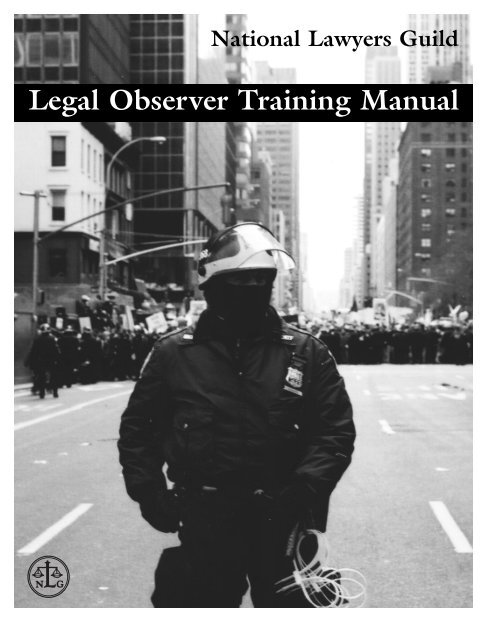
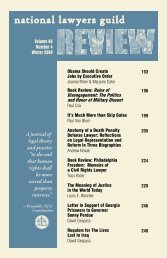
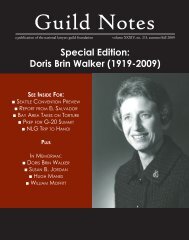
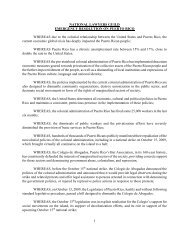
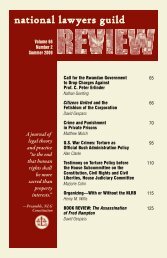
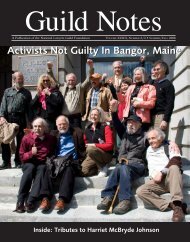
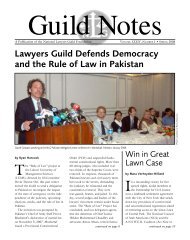
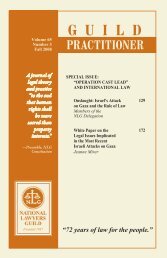

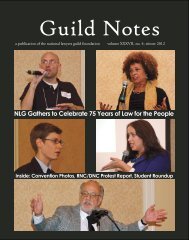
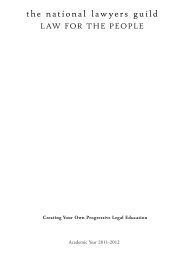
![NLGRev 68-2[1].indd - National Lawyers Guild](https://img.yumpu.com/30820772/1/167x260/nlgrev-68-21indd-national-lawyers-guild.jpg?quality=85)
